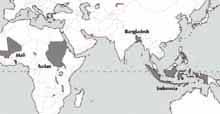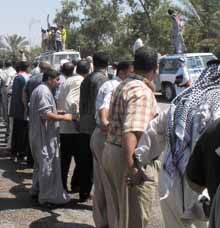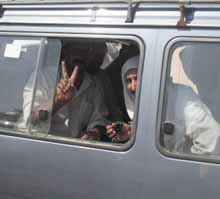In a country wracked with violence, more than one hundred thousand Iraqis marched peacefully through the streets of Baghdad on January 19, 2004 demanding direct elections. Shouting "No to Saddam!" and "No to America," the nonviolent throng - many of them linking hands -- marched for three miles to the University of al-Mustansariyah, where speakers called for a political system based on direct elections and a constitution that realizes justice and equality. As with a similar march in the southern city of Basra four days earlier, many carried portraits of Grand Ayatollah Ali al-Husseini al-Sistani and other Iraqi leaders who opposed both the dictatorship of Saddam Hussein and the U.S.-led invasion and occupation of their country.
The pages of this magazine are full of examples of nonviolent actions that have reined in despots and ousted dictators. So could Iraqis - left to their own devices - have had the potential to topple Saddam Hussein? Quite possibly. Indonesia's Suharto - who ruled the world's largest Muslim nation for more than 33 years - had even more blood on his hands than Saddam, yet he was forced from power in a largely nonviolent uprising in 1998. Largely nonviolent insurrections have also toppled tyrannical leaders of other Muslim states, such as Sudan's Jafaar Numeiri in 1985, Bangladesh's General Ershad in 1990, and Mali's Moussa Traore in 1991. Islam has traditionally emphasized a kind of social contract between the ruler and his subjects which gives the people the right, and even the obligation, to refuse to cooperate with authorities seen as unjust.
Ironically, in Iraq, it has been the US, Great Britain, and other Western nations that may have made the emergence of such nonviolent movements impossible. Most of the world's successful nonviolent pro-democracy movements have centered in the urban middle class and industrial working class. In Iraq, however, thanks to the devastation to the country's civilian infrastructure during the bombing campaign in 1991 Gulf War and the debilitating sanctions that followed, the once-burgeoning middle and skilled working classes were reduced to extreme poverty or forced to emigrate. In their place emerged a new class of black marketeers who had a strong stake in preserving the status quo. Furthermore, the sanctions not only had serious humanitarian consequences - resulting in the deaths of hundreds of thousands of Iraqis from malnutrition and preventable diseases - but actually strengthened Saddam Hussein's grip on power. By forcing the Iraqi people to become dependent on the regime for rations of badly needed food, medicine, and other necessities, the Iraqi people became even less likely to challenge it.
Since Saddam's regime was ousted, continuing Western interference - both politically and economically - have created an environment in which nonviolent options become increasingly difficult, if not impossible, to explore. For instance, the Bush administration strongly opposed holding direct elections during most of the first year of the US occupation. Initially, the US supported the installation of Ahmed Chalabi or some other compliant pro-American exile as leader of Iraq. When it became evident that that would be unacceptable, US officials tried to keep their viceroy, Paul Bremer, in power indefinitely. When it became clear that Iraqis and the international community would not tolerate that option either, the Bush administration pushed for a caucus system where appointees of American appointees would choose the new government and write the constitution. When that was met in January 2004 by hundreds of thousands of Iraqis taking to the streets protesting the US proposal and demanding a popular vote, only then did President Bush give in and reluctantly agree to allow direct elections to move forward.
But instead of going ahead with the election in May 2004 that were called for by Ayatollah Sistani and other Iraqi leaders, US officials postponed the elections until January 2005. Because of this delay, the security situation continued to deteriorate so that by the time the elections finally took place the large and important Sunni Arab minority was largely unable or unwilling to participate. As a result, in most Sunni-dominated parts of the county it was physically unsafe to go to the polls due to threats by insurgents. In addition, the major Sunni parties - angered at the enormous numbers of civilians killed in recent months in US counter-insurgency operations - called for a boycott. The result is a government that is not recognized as legitimate by a key sector of the population - a result that will ensure that conflict in Iraq will escalate.
By contrast, in virtually all the cases where the dictatorship was overthrown from within through nonviolence, elections came quickly and popular participation was widespread. While it is certainly true that transitions from autocratic to democratic governance are not always easy, none of the countries in which autocratic regimes have been ousted by nonviolent movements have suffered like Iraq. Since American and British forces occupied the country, tens of thousands of Iraqis - mostly civilians - have been killed. Malnutrition among children has doubled and childhood mortality has tripled. More than one million refugees have fled the country to avoid the car bombs, assassinations, kidnappings, martial law, deadly roadblocks, and artillery and air strikes from American forces. Lines for fuel can be days long. There are widespread shortages of food, medicine and basic services, and the prices for food and other necessities have greatly inflated. Over half the population is unemployed. In short, a lot more people are suffering and dying in the two and half years since the US invasion than in the two and half years prior to the US invasion.
And there is no end to the violence in sight. The torture of prisoners, the use of heavy weaponry against crowded urban neighborhoods, the shooting at cars filled with civilians at checkpoints, and related actions against innocents mean that the US is creating insurgents faster than its Army can kill them.
Despite enormous odds, some Iraqis are continuing to resist war and occupation through nonviolence. During the first weekend in May, the city of Ramadi and surrounding towns were shut down in a general strike in protest of the US siege on the city of 400,000, assaults on civilian neighborhoods, and the random arrests of thousands of young men by American occupation forces. Adherence to the call for massive nonviolent protest was near total: The streets were deserted, shops and other businesses were shuttered, the bazaars were shut down, and schools, universities and government offices were closed.
In addition to the continuing violence, detentions and lack of basic services, the primary grievance that Iraqis have expressed about the invasion and occupation of their country is the neo-liberal economic system that has been thrust upon them.
Like many Arab governments, Iraq under Saddam Hussein squandered billions of dollars of the nation's wealth through corruption and wasteful military spending. Nevertheless, prior to Saddam's ill-fated invasion of Kuwait and the resulting war and sanctions, Iraqis ranked near the top of Third World countries according to the Human Development Index, which measures nutrition, health care, housing, education, and other human needs.
Not only has the US occupation failed to restore Iraqis to their pre-1991 standard of living, but most of them are poorer now than they were during more than a decade of sanctions following the devastating US-led bombing campaign of the Gulf War. Under Coalition Provisional Authority (CPA) chairman Paul Bremer, radical changes were imposed upon the Iraqi economy closely mimicking the infamous structural adjustment programs shackled to indebted nations by the International Monetary Fund. These include:
· the widespread privatization of public enterprises, which - combined with allowing for 100 per cent foreign ownership of Iraqi companies - renders key sectors of the Iraqi economy prime targets of burgeoning American corporations;
· the imposition of a 15 per cent flat tax, which primarily benefits the wealthy and places a disproportionate burden on the poor;
· the virtual elimination of import tariffs, resulting in a flood of foreign goods into the country; since smaller Iraqi companies - weakened by over a dozen years of sanctions - are unable to compete, hundreds of factories have recently shut down, adding to already-severe unemployment;
· 100 per cent repatriation of profits, which severely limits reinvestment in the Iraqi economy; and
· a lowering of the minimum wage, increasing already widespread poverty.
Recent polls show that less than 7 per cent of the Iraqi public supports these measures and more than two-thirds support a strong government role in the economy. The platform offered by the United Iraqi Alliance, the coalition which won the national elections in January, calls for the state to guarantee a job for every able-bodied Iraqi, to support home construction, to cancel debts and reparations, and use the nation's oil wealth for the country's economic development. They are goals that the Alliance is unlikely to achieve. To add insult to economic injury, the US-imposed interim constitution dictates that the economic 'reforms' imposed during the formal US occupation cannot be overturned except by super-majorities of the National Assembly and the presidential council which will be almost impossible to achieve. As a result, not only will such policies resort in continued economic hardship for the vast majority of Iraq's struggling population, but should the newly-elected government find itself unable to fulfill its promise to meet the economic needs of the population as a result of this externally-imposed neo-colonial economic structure, the credibility of Iraq's democratic experiment could be put in jeopardy.
This systemic attack on Iraq's economy, combined with serious damage to the country's infrastructure from years of sanctions and war, has understandably led to widespread resentment against the foreign occupiers. Since Iraq's highly skilled work force is more than 50 per cent unemployed, it is no surprise that overpaid foreign contractors from such firms as Halliburton - most of them performing jobs that Iraqis could do - have become targets of the resistance. Tragically, there is now a widespread feeling that the US is after Iraq's wealth and is putting the profits of well-connected American companies ahead of the livelihoods of ordinary Iraqis. This has fueled the very armed resistance that has rendered attempts at rebuilding the country - by any economic model - virtually impossible. As a result, Washington may have no more success in imposing its free market utopia on the Iraqis than Moscow had in imposing its socialist utopia on the Afghans.
In this economic transition, the Iraqis are not alone. While hundreds of millions of people throughout the world now have more individual freedom and more accountable government as a result of the power of nonviolence, most of them have no more say over their countries' economic policies than do the Iraqis. In other words, while the use of nonviolent action against autocratic regimes may have had a remarkable degree of success in bringing about long-denied civil and political rights, they have been less successful in improving social and economic rights that could help to reinforce popular support for democratic governance and nonviolent change.
In the spring of 1997, seven years after the conclusion of the U.S.-Contra war against Nicaragua's Sandinista government which led to the end of that Central American nation's socialist experiment, tens of thousands of Nicaraguans engaged in a general strike to protest the austerity programs of the conservative President Arnoldo Alemain's government. Former Sandinista soldiers and former Contras left their guns at home to work together to set up roadblocks and engage in street protests where they adhered strictly to a disciplined nonviolence. The government, in the face of massive nonviolent resistance, relented and the austerity measures were withdrawn. However, the US, through the International Monetary Fund, forced the government to implement the austerity plan anyway. As Alejandro Badana, a leading Nicaraguan intellectual, told an American audience a few months later, "Will the people of the North allow the people of the South to succeed through nonviolence?"
This presents a challenge to those of us in the industrialized world who recognize the power of nonviolent action. For it is not enough to stand by on the sidelines and call on the oppressed to fight dictatorship and promote democracy and human rights where the worse manifestations of militarism, economic injustice and crimes against humanity take place. For the roots of much of this violence stems from the decisions of governments and economic institutions in advanced industrialized nations. Where active nonviolence is most badly needed, then, may not be in Latin America, the Middle East or anywhere else in the developing world, but here in Western democracies. And it behooves us not to just be observers and sympathizers, but active participants.



